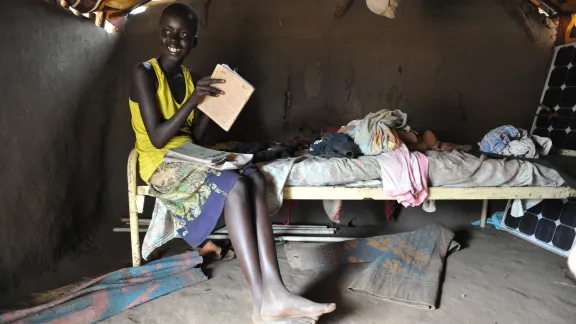
Nyaring, 13, South Sudanese refugee who came from Bor. LWF built her a house and provides her with school materials and cash. Photo: M. Renaux
LWF caring for the youngest survivors of war
ADJUMANI, Uganda / GENEVA, 20 June 2015 (LWI) – It’s exam time in Ayilo 1 primary school, but Nyaring’s (not her real name) smiling face indicates that maths and social science were not too much of a challenge to her. “There was a question on the five districts of Uganda,” the 13-year-old says, trying to recall the paper she sat in the morning. She casts a look at her friends giggling in the distance.
Looking at her smiling face, nobody would believe how much Nyaring’s life was uprooted a year ago. She is a refugee from Bor, Jonglei – the county most affected by the South Sudanese conflict which started a year ago. “We were sleeping when the shooting started,” she says. “My father told us to run. We saw people with guns, and others who were running away. A man with a motor boat helped us to get to the other side of the river.”
Children most vulnerable
Children like Nyaring are a sad but common occurrence in armed conflict. Registered as separated children - those who have lost their families on the flight, or as unaccompanied minors – children who came without parents – they are especially vulnerable to exploitation and neglect. Providing for them, finding and monitoring a suitable foster arrangement is part of the work The Lutheran World Federation does in the Ugandan refugee camps Adjumani and Rwamwanja.
Nyaring was supported with shelter and cash grants for school materials. Her well-being is monitored by LWF case workers and field extension staff, who regularly visit and talk to her and her siblings to see that she is taken care of and well-treated. If no foster arrangement can be found, LWF has a shelter where a caregiver looks after unaccompanied and separated children and makes sure they attend school. Other agencies, such as the International Committee of the Red Cross, meanwhile try to unite the children with their families, if possible.
“Most of the time she is really happy,” Santa Lamunu, LWF Protection Officer in Adjumani, says about the girl. “When they arrive the children are very shy and traumatized. It takes time for them to open up.” Nyaring misses home, the hut built of grass, and the animals. The family kept cattle and 13 goats, which used to be Nyaring’s charge. They were taken in the conflict as well. “I am good at looking after them, but there are no goats here,” she says.
Knowing someone is taking care
Nyaring was lucky to meet her aunt as she fled. She had already been taken when LWF came to assess her situation and make the arrangement official. “With the ongoing conflict, it is very hard to re-unite the children with their families,” Lamunu says.
Two and a half hours from Nyaring’s house, Colleen Betty Ariye is doing the impossible. At the age of 66 she has become the mother to seven foster children. Four of them are her grandchildren, one is a great-grandchild. She does not know what happened to her daughter, the mother of her charges, but she heard that she had been killed in Bor. Their father was a driver in the army and fell victim to the conflict as well.
While the children are in school or attending the pre-school program in child-friendly spaces, the widow of a pastor cleans, cooks, collects firewood and sweeps the nearby market for money. On the weekend, the older children help her. “They have formed a very strong bond,” Lumunu says. At her age, Colleen worries about the future of the children, some of which are still toddlers. “I have LWF support, and I can only trust they will be taken care of,” she says.
Flip-flops are scattered in front of the hut that the extended family shares, a second hut stands half-ready on the plot she has been given. “Sometimes when I wake up, I don’t know what to do,” she says. “It’s very difficult.” She also received shelter and cash from LWF to support her in taking care of the children, and is regularly visited by LWF case workers. “The older children know their mother is dead. The younger ones think I am their mother,” she says.
LWF is committed to ensuring the most vulnerable people within communities have access to material assistance, support and specialist care that addresses their psychological, physical and social needs and enables their full participation in communities.


